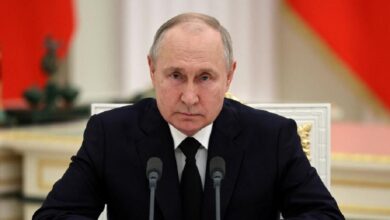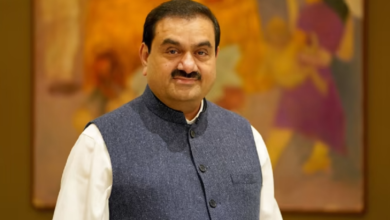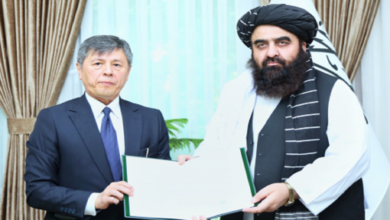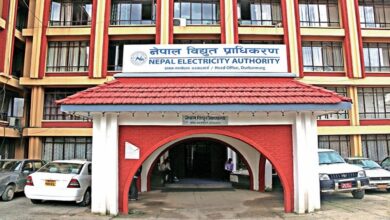Nepal should choose small projects under BRI, and with other partners
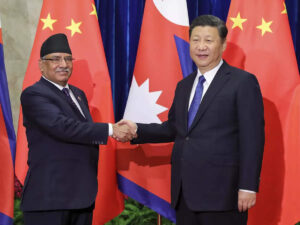
By Thira Lal Bhusal
The government’s recent decision to recall ambassadors, particularly Nepal’s envoy to India, just ahead of Prime Minister Pushpa Kamal Dahal’s visit to New Delhi, courted widespread controversy. What are the takeaways of the prime minister’s Delhi visit? What is the progress in implementing the trade and transit agreement signed with China and with the BRI projects? Thira Lal Bhusal of the Post sat down with Rupak Sapkota, foreign affairs advisor to the prime minister, for some insights.
The government’s decision to recall ambassadors from 11 countries at once has come under heavy criticism. Why did the government take such a decision?
In general, it has become a practice of sorts to recall incumbent ambassadors and appoint new ones after changes in the government or in the ruling coalition. This has both merits and demerits. The country’s foreign policy doesn’t change with a change in government. But every government and coalition has its specific policies, programmes and priorities. Therefore, even other countries make changes in political appointments as per the government’s priorities. Our case is a bit different. Ruling coalitions are frequently changed, and so are ambassadors. As there is a high chance of our politics being governed by coalitions given our electoral system, it has become necessary to establish a rational system on ambassadorial appointment. Either the political appointees themselves should voluntarily quit the job and return home just like vice-chair and members of the National Planning Commission do. Or there should be a consensus among major political forces to allow our ambassadors to serve out the full term.
The second option of allowing ambassadors to serve out their term sounds better, doesn’t it?
Definitely. Some initiatives have been taken with the objective of making our diplomatic appointments more prestigious, merit-based and better-managed. The government in 2019 introduced some criteria on ambassadorial appointments. We have to put more effort into ensuring that our ambassadorial appointees have the capacity to effectively carry out diplomatic duties. Once we establish a system of appointing envoys based on merit and not out of political biases, we can create a situation of allowing them to serve for the full term. Then, a change of coalition wouldn’t affect their continuity. We need to develop such a political consensus, given our geopolitical sensitivity.

But the ambassadors appointed in recent years and their activities in host countries have lowered the bar of our diplomacy.
We have seen rapid and huge changes in power equations in the world. In view of that, we can see some countries have appointed former ministers and even prime ministers as envoys to the countries with whom they have vital relations. They also appoint such personalities as envoys for a special mission. So, we have to think about ambassadorial appointments from different perspectives based on the changed context. It is high time that all the political forces and leaders agree on a basic point that those who have in-depth understanding and expertise of the field and can work for the best interest of the country will be appointed the country’s ambassadors. If the individual is competent, the person’s affiliation to a political party may not be a problem. But whether the person can work in the best interest of the country must be considered before appointment.
But the government itself doesn’t seem serious about maintaining diplomatic decorum. For instance, the June 6 Cabinet meeting decided to recall the ambassador from India just days ahead of the prime minister’s New Delhi visit. There were also reports that the prime minister made the decision reluctantly due to pressure from coalition partners. What is the real story?
It is nothing more than a coincidence. There were discussions about making changes in the ambassadorial positions in line with the March 4 changes in the ruling coalition. But it was deferred as the government needed to accomplish some important tasks and convene events such as the investment summit. When the government decided to change our ambassadors, it just happened to coincide with the prime minister’s visit to New Delhi to attend the swearing-in ceremony of Indian Prime Minister Narendra Modi. It was a coincidence. Despite the decision, the ambassador had sufficient time to properly conclude all his engagements and duties there. The way he facilitated the process during the prime minister’s visit doesn’t reflect any misgivings about the government’s decision. So, it should be taken as a course that is in keeping with our tradition.
In recent decades, other countries have given top priority to economic diplomacy, but the selection of our envoys and their activities doesn’t reflect that. Why aren’t we thinking in that direction?
Yes, diplomacy in the past used to be one-dimensional, or it was conducted mainly by one particular ministry—the Ministry of Foreign Affairs. These days, many other ministries are engaged with international agencies. Economic diplomacy, labour diplomacy, climate diplomacy and security affairs have become crucial. We have to increase coordination, cooperation and collaboration among relevant agencies to make our international relations more fruitful and in line with the policies and goals set by our government.
We have seen profound changes in terms of approaches, perspectives and dynamics of diplomacy in recent decades. All countries have started to give more importance to the competence of diplomats also in view of the increased geopolitical competition and rivalry seen between world powers. Rapid innovation in science and technology has not only eased our lives but also added challenges. We have to handle so many diplomatic engagements. Similarly, the number of international forums where we have to engage are increasing. These days, multilateral diplomacy and engagements have become as important. Even minilateral forums have started to play vital roles in international relations as the world powers have adopted multiple strategies to create their spheres of influence. In the meantime, the role of public diplomacy has become influential. So, a diplomat today must be dynamic and efficient enough to grasp the international situation, understand the sensitivity of the host country, articulate our country’s views efficiently and work in national interest. Therefore, it has become vital to be extra careful while selecting ambassadors.
You talked about better coordination but we don’t see any correction in the practice of bypassing the foreign ministry while working with international agencies.
Definitely, the foreign ministry is our focal point for all international relations conducted by a ministry or agency of our country. There should be no dispute about that. We need to make the foreign ministry more resourceful. Then, the ministry will have more capacity and efficiency to handle issues related to security, finance, labour and climate.
Why have we failed to maintain reciprocity in terms of diplomats’ relations with the leaders of host countries? For example, our ambassadors in some capitals don’t get to meet the host leaders for years while the foreign envoys in Kathmandu can meet our prime minister and foreign minister directly and instantly.
We have to see it from two perspectives. One is the power structure. In international relations, we can see the reflection of the asymmetric power relations between the big powers and other countries. The more developed and resourceful country’s influence in a host country can be seen and felt. Second, despite being an envoy from an underdeveloped or a small country, one can have diplomatic relations based on the principle of sovereign equality. It depends on the individual diplomat as well.
In Kathmandu, we often err when dealing with foreign envoys. We have to decide what level of importance to give them. Therefore, some initiatives have been taken to correct and maintain consistency by implementing a diplomatic code of conduct that aims to integrate all activities through the foreign ministry. Foreign envoys will follow the system if we implement it consistently, irrespective of changes in the government. For that, there should be a political understanding at the national level.
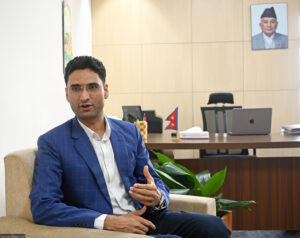
Let’s move to Prime Minister Pushpa Kamal Dahal’s recent India visit. Though it was mainly to attend the swearing-in ceremony of Indian Prime Minister Modi, he held some important political meetings. What are the takeaways from the visit?
The visit was important from bilateral, regional and international perspectives. Traditionally, foreign affairs was described as an extended form of domestic affairs. But these days, international affairs have influence over domestic affairs as well. So such meetings and dialogues at the prime minister’s level are important. They exchanged views in a very cordial atmosphere. Of late, we have maintained bilateral dialogues at the political level on a regular basis and that has helped remove misunderstandings. Our prime minister’s emphasis is to hold bilateral dialogues both at the political as well as diplomatic levels in order to settle differences. India has taken this spirit positively.
Second, the two prime ministers discussed how to expedite the implementation of the agreements reached between Nepal and India during Prime Minister Dahal’s official visit a year ago. The issue was discussed during the meeting between Prime Minister Dahal and Indian External Affairs Minister S Jaishankar as well. They also expressed satisfaction over progress in the implementation of bilateral agreements mainly in energy trade, connectivity and investment. In recent years, we have seen progress in investment, economic and trade sectors. Yet we still have some differences on border issues. That is an important and positive development in Nepal-India relations in recent years. In the past, when we had some differences on political, border or other issues, that used to badly affect other aspects of our relations. But now, both the countries agree to resolve outstanding issues through dialogue and our trade and all other affairs are moving ahead smoothly. This is the encouraging part of our relations.
But border disputes can sour our relations anytime, right? Is there a sense of urgency to resolve it once and for all?
The prime minister is for activating the concerned bilateral mechanisms to resolve such issues. He has also invited Indian Prime Minister Modi to visit Nepal. We can expect the Indian prime minister’s Nepal visit in near future. We can make some progress in resolving some outstanding matters such as border issues during the high level visit. I believe we will move ahead in this direction.
Any progress on submitting the report of the Eminent Persons’ Group?
During the meetings, the prime minister raised overall bilateral issues that include the matter related to the EPG report. I think once the mechanisms are activated and start working, that will create a situation for the report’s submission.
Nepal and Bangladesh are completing homework for greater energy trade. India’s facilitation is a must for that. Is there any progress on securing the southern neighbour’s support for that?
Progress in energy cooperation is a major achievement of this tenure of the prime minister. The progress is not limited to the bilateral level but goes to the regional level. A Cabinet committee of the Bangladesh government earlier this month approved a proposal to import 40 megawatts of electricity from Nepal. At present, we will use India’s infrastructure to export energy to Bangladesh. But for the long term there is a plan to build a dedicated transmission line for that. This shows it is not only Nepal that is interested in exporting its energy but other countries in this region are also interested in importing Nepal’s electricity. We have also signed an agreement to build a cross border transmission line with China. The doors are being opened for regional trade of our energy. This development will make India more open to importing energy from Nepal.
Why are we failing to expedite projects under the Belt and Road Initiative (BRI) of China?
The economic cooperation between Nepal and China has substantially increased after we joined the BRI framework. So, Nepal has been benefitting from the BRI. We see some concern about the lack of progress on certain infrastructure projects to be built under the BRI framework. In fact, we are in a better position to implement the projects because now we can decide what kind of BRI projects are good for us based on the experience of project development and implementation under the BRI in other countries.
We are working to finalise the BRI implementation agreement. Nepal wants to move ahead by signing the implementation agreement and developing the projects. Nepal joined the BRI framework based on its need to diversify trade and connect to the world market. The reality is the same now. So, we need to sign the implementation plan and move ahead as soon as possible. When I attended the Boao Forum a few months ago, I found the Chinese authorities and other stakeholders holding debates to build quality and resilient infrastructure. They also have plans to support the capacity enhancement of human resources and transfer technology in the BRI member countries.
People mainly link the BRI with big infrastructure projects such as railway, road and transmission connectivity but there is no significant progress on these fronts. What are the roadblocks?
In Nepal, no big infrastructure project has been completed on time, be it the Melamchi drinking project, airports, hydropower or road projects. We haven’t developed the capacity to build big projects, and we don’t envision any plan to operate after building it. So, not only with China but also with other countries and agencies, we have to seek support for small and medium-size projects that we can efficiently build and operate. Also, the third version of the BRI action plan has included building not only big but small and smart projects under the framework. We have to push for that. As we build our capacity, we can gradually take up big projects. For instance, now we can build big hydro projects on our own. It wasn’t the case until some years ago. We developed expertise in hydropower by building many small projects in the past few decades and gradually enhanced our capacity.
We have already faced problems in operating the Pokhara and Bhairahawa airports. Is there any progress in taking Chinese support to operate the airports?
We have to see both aspects—domestic as well as international use—of the airports. The two airports have helped us upgrade the quality of our domestic air travel as the passengers have benefited due to the upgraded infrastructure. The number of domestic passengers in these airports has increased significantly.
It is true that there is no progress in terms of operating them as international airports. The government is studying all possibilities of their use based on their unique features. We are exploring various options in international markets to attract adventure tourists to Pokhara. Chinese stakeholders are also holding some promotional activities in Pokhara. Chinese authorities have told us that they are consulting with their provincial bodies and exploring possibilities to run regular flights to Pokhara. Similarly, the government is mobilising our embassies and other stakeholders in certain countries having a large number of Buddhist tourists to operate flights to Bhairahawa, and we have received some positive responses. I believe we will be able to operate regular international flights from these two airports soon.
It’s been eight years since we signed the trade and transit agreement with China, which was touted as a historic deal between the two countries. Why haven’t we been able to implement it?
Some symbolic steps have been taken in this period. For instance, a shipment was received from a third country [Vietnam] using a Chinese port in September last year. Similar other initiatives have been taken but these are limited to symbolic gestures. We have to prepare infrastructure and some legal basis to implement the agreements in a more result-oriented way. A bilateral meeting is being held this week. The meeting is likely to discuss how to bring the trade and transit protocol in an effective way. This meeting will discuss various issues faced so far and will also pave the way forward. We have also proposed to form a ministerial-level mechanism to oversee overall bilateral issues. The upcoming meeting will sort out various issues.
The Chinese side was conducting a feasibility study of the Keirung-Kathmandu cross-border railway project. What is the progress?
There is progress in various projects that we are carrying out with Chinese support. The cross-border railway feasibility study is in the final stage. Likewise, the study on the Chhahare-Tokha tunnel project is ongoing. A Chinese team is arriving to conduct a feasibility study of the Hilsa-Simkot road. A process to award a contract to build a friendly bridge at Hilsa with Chinese grants has begun. A foundation stone will be laid there soon. Also, a study to build the Chilime-Rashuwagadhi-Keirung 220kV cross-border transmission line is beginning soon.
Thira Lal Bhusal
Thira Lal Bhusal is News Editor of The Kathmandu Post.

